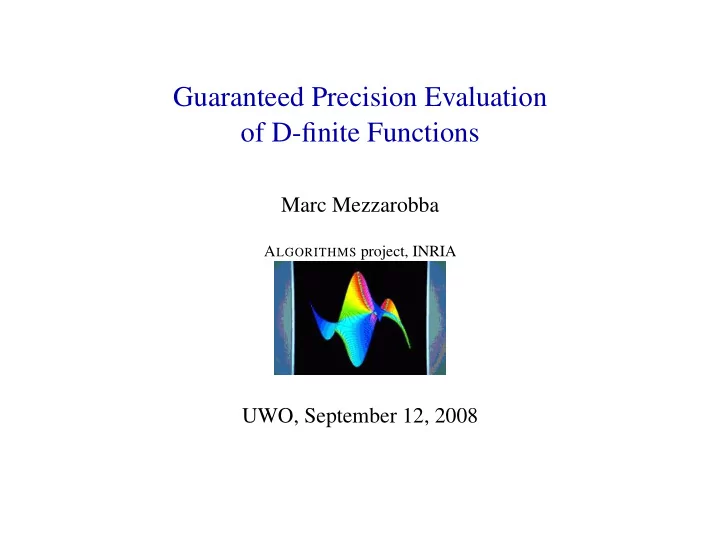

Guaranteed Precision Evaluation of D-finite Functions Marc Mezzarobba A LGORITHMS project, INRIA UWO, September 12, 2008
Introduction Recurrence Unrolling Numerical Evaluation Constant factors Conclusion NumGfun ◮ A Maple package for symbolic-numeric computation with D-finite functions and sequences in one variable ◮ Guaranteed precision evaluation ◮ Bounds for sequences ◮ . . . ◮ Version 0.2 available (still experimental!), LGPL http://www.marc.mezzarobba.net/code/NumGfun-current.tgz ◮ Integration into gfun / algolib in progress http://algo.inria.fr/libraries/ Bruno Salvy and Paul Zimmermann, Gfun: a Maple package for the manipulation of generating and holonomic functions in one variable, 1994. 2 / 38
Introduction Recurrence Unrolling Numerical Evaluation Constant factors Conclusion Bound Computations ◮ Baxter permutations ◮ ( n + 2 )( n + 3 ) B n = ( 7 n 2 + 7 n − 2 ) B n − 1 + 8 ( n − 1 )( n − 2 ) B n − 2 , B 0 = B 1 = 1 ◮ B n ≤ ( n + 8 ) 8 8 n ◮ t k = ( − 1 ) k ( 6 k )!( 13591409 + 545140134 k ) ( 3 k )!( k !) 3 640320 3 k ∞ 12 t k = 1 � (Chudnovsky 2 1988) ◮ 640320 3 / 2 π k = 0 � � n − 1 640320 3 / 2 � � � � ≤ ( 0 . 1 n 4 + 0 . 5 n 3 + 1 . 5 n 2 + 2 . 1 n + 1 ) α n � � − t k ◮ � � 12 π � k = 0 1 151931373056000 ≃ 0 , 66 · 10 − 14 where α = 3 / 38
Introduction Recurrence Unrolling Numerical Evaluation Constant factors Conclusion Function Evaluation A Familiar Example ( 1 + z 2 ) arctan ′′ ( z ) + 2 z arctan ′ ( z ) = 0 arctan 3 ( 1 + i ) ≃ 0,670782196758950644190815337 5 4705632571369265547562721682009119775363456 i 2788546268206648547182112134208947460355580 z 1 1433079787592299964529081793221227836458496 7241027751816658681028242709786087804231203 0 5059588657436137542728611075919334091735855 + 0,4313775209217135982596553539683059915248 − i 7122502784763704416333662458132714904677846 9188664848592351371193308077157250027646988 5281752378714171283456698686337133570545945 8746821430812351884522098343403327937148536 338890142864171080500321 i 4 / 38
Introduction Recurrence Unrolling Numerical Evaluation Constant factors Conclusion Numerical Evaluation of Special Functions Goal Compute special functions to high precision d → ∞ Assume y ( z ) = � ∞ n = 0 y n z n . To compute y ( z 1 ) to a (user-chosen) accuracy ǫ = 10 − d : � � � y ( z 1 ) − � N − 1 � � ≤ ǫ � n = 0 y n z n 1. Compute N such that 1 2 − → BOUNDS ◮ Van der Hoeven 1999, 2001, 2003, 2006 ◮ Previous slide: work in progress with B. Salvy 2. Compute � N − 1 n = 0 y n z n 1 J. van der Hoeven. Fast evaluation of holonomic functions. 1999. J. van der Hoeven. Majorants for formal power series. 2003. 5 / 38
Introduction Recurrence Unrolling Numerical Evaluation Constant factors Conclusion Numerical Evaluation of Special Functions Goal Compute special functions to high precision d → ∞ Assume y ( z ) = � ∞ n = 0 y n z n . To compute y ( z 1 ) to a (user-chosen) accuracy ǫ = 10 − d : � � � y ( z 1 ) − � N − 1 � � ≤ ǫ � n = 0 y n z n 1. Compute N such that 1 2 − → BOUNDS 2. Compute � N − 1 n = 0 y n z n 1 ◮ This talk J. van der Hoeven. Fast evaluation of holonomic functions. 1999. J. van der Hoeven. Majorants for formal power series. 2003. 5 / 38
Introduction Recurrence Unrolling Numerical Evaluation Constant factors Conclusion Algorithms “If y is D-finite, this strategy (sum the Taylor series) is competitive” Binary splitting (Chudnovsky 2 1988): a family of algorithms that are ◮ General: whole class of D-finite functions ◮ Efficient: quasi-linear time complexity w.r.t. size of output ◮ Practical ◮ Actually used. . . in special cases only! (NumGfun = first general implementation?) D.V. and G.V. Chudnovsky. Approximations and complex multiplication according to Ramanujan. 1988. 6 / 38
Recurrence Unrolling
Introduction Recurrence Unrolling Numerical Evaluation Constant factors Conclusion An Example from Combinatorics Motzkin Numbers ( n + 3 ) M n + 2 = 3 n M n + ( 2 n + 3 ) M n + 1 , M 0 = 0 , M 1 = M 2 = 1 = 87836485521410228205552857212867952 M 1 000 000 60648460114018772686310027332206011651992742068 95017531901406553089345501470120232183076893776 0, 1, 1, 2, 4, 76219223691237769669136651142176793088580998640 9, 21, 51, 24791593930900669539159753966399354360360024084 127, 323, 835778 . . . 6784078518570776088261222699220919525 835, 2188, 44768602806558705745804408930594940932105099980 5798, 15511, 80763012645020992166911388664219549747372475451 41835, 13677895449716717989937706488976239581832306432 113634, 74956942565741376149791829585290393680786291940 310572, ... (477 112 digits) 8 / 38
Recommend
More recommend